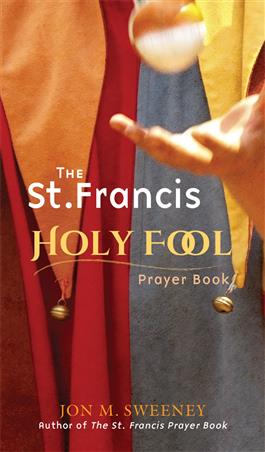The St. Francis Holy Fool Prayer Book
Excerpted from the Introduction
The Good Fool
For those who try to live the Gospel, and by doing so, feel like fools
Here we are, fools for Christ’s sake, while you are the clever ones in Christ; we are weak, while you are strong; you are honored, while we are disgraced. To this day, we go short of food and drink and clothes, we are beaten up and we have no homes; we earn our living by laboring with our own hands; when we are cursed, we answer with a blessing; when we are hounded, we endure it passively; when we are insulted, we give a courteous answer (1 Cor. 4:10–13).
Otherwise known as holy fools.
 This can be confusing and for good reasons. Even the Bible seems to contradict itself about fools. A fool for Christ’s sake is altogether different from the kind of person the psalmist describes when he or she begins, “The fool says in his heart, ‘There is no God.’ They are corrupt, their deeds are vile; there is no one who does good. The Lord looks down from heaven on all mankind to see if there are any who understand, any who seek God. All have turned away, all have become corrupt; there is no one who does good, not even one” (Ps. 14:1–3). That’s not a foolishness to emulate! Nevertheless, St. Paul’s foolishness is. The Bible speaks about both kinds of fools—good and bad—but for the most part, the good sort has been lost.
This can be confusing and for good reasons. Even the Bible seems to contradict itself about fools. A fool for Christ’s sake is altogether different from the kind of person the psalmist describes when he or she begins, “The fool says in his heart, ‘There is no God.’ They are corrupt, their deeds are vile; there is no one who does good. The Lord looks down from heaven on all mankind to see if there are any who understand, any who seek God. All have turned away, all have become corrupt; there is no one who does good, not even one” (Ps. 14:1–3). That’s not a foolishness to emulate! Nevertheless, St. Paul’s foolishness is. The Bible speaks about both kinds of fools—good and bad—but for the most part, the good sort has been lost.
The foolishness praised by St. Paul is a way of living out Jesus’s teachings in the Beatitudes. “Beatitude” comes from a Latin word that means happiness. These are ways to true happiness, and of course they aren’t what you might expect. Who is blessed? The poor in spirit, the meek, the hungry and thirsty, people who are peacemakers—not the powerful. Even the “pure of heart”—and the phrase means pretty much what it implies, and that is, those who are simple or willingly naive—are singled out as blessed. Do you want to sign up for this sort of blessedness, happiness? Not many do. That’s why we call them fools. Holy fools.
A Christian can point to Jesus’s foolishness as the exemplar, just as Jesus sometimes pointed to the Hebrew prophets as his inspiration for defying others’ expectations. Like Jeremiah, Jesus dressed simply. Like Isaiah, Jesus often walked around barefoot, and he didn’t know where he was going to sleep at night. Contrary to what religious leaders thought appropriate, Jesus chose a strange mix of people as his followers and friends (women, the poor, despised tax collectors, the untouchable sick). Occasionally, he went against societal norms and theological expectations with an attitude of naiveté. No matter if someone thought he was “dumb.”
Even Jesus’s own family thought he was a fool at times—and not the good kind. Just after he appointed his twelve disciples, the Gospel of Mark says: “He went home again, and once more such a crowd collected that they could not even have a meal. When his relations heard of this, they set out to take charge of him; they said, ‘He is out of his mind’” (Mk. 3:21). In twenty-first-century language, that sounds like they staged an intervention! They wanted to set him straight. Perhaps he was embarrassing the family.
Later, when Jesus was teaching Torah—good rabbi that he was—he invariably shocked his listeners, ratcheting up the expectations of God on those who seek to truly follow him. He said, for example: “You have heard how it was said, You shall not commit adultery. But I say this to you, if a man looks at a woman lustfully, he has already committed adultery with her in his heart” (Matt. 5:27–8). Seriously?! What was once a law of Moses, easy to track in one’s life, just got a whole lot tougher. Who would even know if one was observing a law such as this? The religious leaders of the day thought he was nuts.
Jesus was a holy fool in his not worrying about the outcome or result of his teaching. Most important of all, he was a holy fool for allowing himself to be misunderstood, and later, mocked. He didn’t defend himself when the meaning and purpose of his life was questioned by Pontius Pilate. He was willing to stand physically humiliated before crowds. In these ways alone, without any other agenda, there have been saints throughout history who have sought to imitate our foolish Lord.
I give you the end of a golden string; Only wind it into a ball, It will lead you in at Heaven’s gate, Built in Jerusalem’s wall. —William Blake, from Jerusalem: The Emanation of the Giant Albion
There is a perfect line, an uncut thread, “a golden string” throughout history that connects the foolishness of Christ with holy fools who have lived in every generation since his death and resurrection. They all have understood how being reviled can be a sign of blessedness or holiness, a true mark of God’s Spirit alive inside of someone. When people witnessed this foolishness in Francis of Assisi eight hundred years ago, they called him pazzo. That’s Italian for “crazy”—so, I guess, we can’t avoid the term! The adjective, however, made Francis happy, in the sense that he knew: if they call you crazy or a fool, you must be doing something right!
The first instances of the crazy foolishness in Francis were outpourings of the Spirit in him. In other words, they are difficult to explain if you use only rational or pragmatic ways of understanding: Like when he stripped naked in front of a crowd in order to give everything back to his father that was rightfully his. Or when he began preaching to birds after people didn’t seem to pay much heed to his words. Or when he scolded some of those birds for not listening carefully enough and chirping too loudly during Mass. Or when he joined a friend and disciple in deliberately humiliating himself—Francis had punished his friend by holy obedience (he was, by then, the friend’s religious superior) for refusing to preach the Good News. The punishment was: go and preach, then, in your underwear. But a few minutes later, Francis chastised himself for being too severe— and decided to repent by stripping down to his breeches himself and joining the friend in the pulpit.
Why would someone do these things? They don’t exactly make sense, do they? And yet, somehow, they did, and do.
Here’s another bit of context: At the time that Francis and Brother Juniper, one of his closest friends and first followers, were becoming fools for Christ, there were professional fools—hired in noble and royal courts, as well as traveling from town to town—acting as entertainers but also as truth-tellers. They were often regarded as possessing a strange sort of wisdom that comes from being detached from the normal ways of the world. They never stopped reminding their audiences that the world will lie to you, deceive you with false appearances; that it may seem rational but actually it is mad. You see such a troupe in Shakespeare’s Hamlet, for instance (act 5, scene 1). They are the grave diggers who appear after Ophelia’s suicide, bantering about death, love, and the meaning of life.



 has been remarked on many times over the years by those fortunate enough to meet Mother Teresa, and that is the radiant joy which shone in her face, a joy which, from moment to moment, seemed to illumine her every expression.”
has been remarked on many times over the years by those fortunate enough to meet Mother Teresa, and that is the radiant joy which shone in her face, a joy which, from moment to moment, seemed to illumine her every expression.”